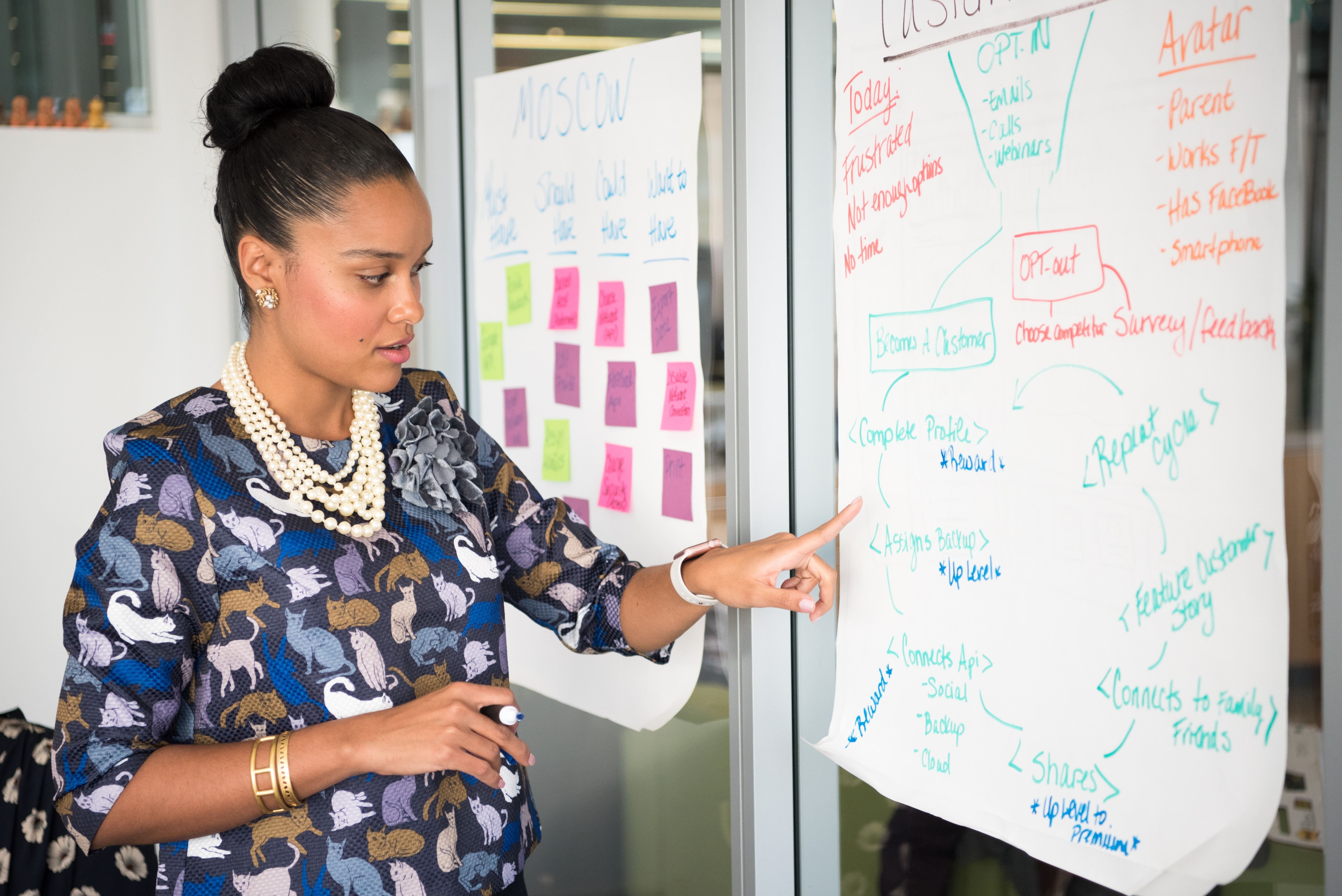Tips and Strategies for Career Development
May 30, 2023
9 min read
Career development involves setting goals, seeking growth opportunities, and prioritizing personal growth. It requires proactive planning, continuous learning, and adapting to changes. By investing in professional development and embracing new opportunities, individuals can advance their careers and achieve long-term success.

- Image By Unsplash
Table of content
A successful career doesn't happen overnight; it requires deliberate planning, continuous learning, and strategic decision-making. In today's fast-paced and competitive world, individuals need to proactively manage their careers to stay relevant and achieve long-term success.
Whether you're just starting your professional journey or looking to advance in your current role, this blog post will provide valuable tips and strategies to help you navigate the path to career development.
1. Self-Assessment and Goal Setting
The first step in career development is to embark on a journey of self-discovery and self-assessment. Understanding yourself and your aspirations is crucial in charting a fulfilling and successful career path.
Taking the time to conduct a thorough self-assessment allows you to identify your skills, strengths, interests, and values, providing invaluable insights into who you are and what you want to achieve in your professional life.
During this introspective process, you can reflect on your past experiences, both academic and non-academic, to identify patterns and areas where you excel. Assess your skills and abilities, including technical skills, interpersonal skills, and problem-solving capabilities. Consider your natural talents and what comes easily to you, as these can be strong indicators of your areas of strength.
Additionally, delve into your interests and passions. Explore the subjects and activities that genuinely captivate your attention and ignite your enthusiasm.
Think about the topics or industries that you find intriguing and that you could envision yourself working in for the long term. Identifying your genuine interests can guide you toward a career that aligns with your passions, leading to greater job satisfaction and engagement.

2. Continuous Learning and Skill Development
In today's rapidly changing and competitive work environment, continuous learning has become an essential component of career growth and success. The skills and knowledge that were in demand yesterday may not be sufficient for tomorrow's challenges.
To stay ahead and remain relevant in your industry or desired role, it is crucial to identify the skills required and actively seek opportunities to develop them.
Start by conducting thorough research on your industry and the specific skills that are highly valued and sought after. Pay attention to emerging trends, technological advancements, and evolving job requirements.
This will help you stay informed about the skill sets that are in demand and enable you to proactively equip yourself with those skills.
Once you have identified the skills you need to acquire or improve upon, explore various avenues for learning and development. There are numerous options available, ranging from attending workshops, webinars, or conferences to enrolling in online courses or pursuing advanced degrees.
Assess your learning style and preferences to determine which methods of learning are most effective for you. Some individuals thrive in structured academic settings, while others prefer self-paced online courses or hands-on practical experiences.

3. Networking and Building Professional Relationships
Networking is not just a buzzword; it is a powerful tool for career development and professional growth. Building a strong network can open doors to new opportunities, provide valuable insights, and help establish your presence in your industry.
While there are various strategies to expand your professional network, attending industry events, joining relevant associations, and engaging with peers on social media platforms like LinkedIn are highly effective ways to get started.
Attending industry events is an excellent opportunity to meet professionals from different backgrounds and establish connections. These events are often filled with experts and thought leaders who can provide valuable insights into the latest trends and developments in your field.
Actively participating in workshops, panel discussions, and seminars allows you to showcase your knowledge and expertise, making a lasting impression on others.
By engaging in conversations, exchanging business cards, and following up with new contacts, you can foster meaningful relationships that may lead to collaborative projects, job referrals, or even mentorship. Joining relevant associations and professional organizations is another avenue to expand your network.
These groups often provide exclusive access to industry-specific resources, events, and communities. By actively participating in association activities, such as attending conferences, webinars, and networking events, you can connect with like-minded professionals who share your interests and goals.
Engaging with these individuals not only allows you to stay informed about the latest industry trends but also opens doors to potential collaborations and partnerships.

4. Developing a Personal Brand
In today's highly competitive job market and digital age, developing a strong personal brand has become crucial for both professionals and individuals seeking to stand out from the crowd.
A personal brand encompasses the unique value proposition, qualities, and expertise that define who you are and what you bring to the table. It involves effectively communicating your strengths, skills, and accomplishments to create a lasting impression on potential employers, clients, or collaborators.
Crafting a compelling personal brand requires careful consideration and strategic planning. Here are some essential steps to help you build and communicate your personal brand effectively:
-
Define Your Unique Value Proposition: Start by identifying your strengths, skills, and unique qualities that set you apart from others in your field. Consider your expertise, experiences, and passions. What makes you different? What problems can you solve? Clearly defining your unique value proposition will be the foundation of your personal brand.
-
Create a Professional Resume: Your resume is a crucial component of your personal brand. Craft a well-designed and tailored resume that highlights your key achievements, skills, and experiences. Emphasize how your expertise aligns with the needs and expectations of your target audience. Keep it concise, organized, and easy to read.
-
Optimize Your LinkedIn Profile: LinkedIn is a powerful platform for building your personal brand and expanding your professional network. Create a compelling LinkedIn profile that reflects your unique value proposition. Include a professional headshot, write a concise and engaging summary, and provide detailed information about your experience, skills, and accomplishments. Optimize your profile with relevant keywords to improve visibility in search results.

5. Embracing Challenges and Seeking Feedback
Embracing challenges and seeking feedback are fundamental aspects of personal and professional development. Rather than shying away from difficult situations, it is crucial to view them as opportunities for growth and self-improvement.
By embracing challenges, we open ourselves up to new experiences and push the boundaries of our comfort zones. This willingness to step into the unknown allows us to learn from our mistakes, acquire new skills, and expand our capabilities.
When faced with a challenge, it is essential to approach it with an open mind and a positive attitude. Rather than being overwhelmed by the initial difficulty, focus on breaking the challenge down into smaller, manageable tasks.
This approach enables you to tackle each component step by step, gradually building your confidence and expertise along the way. By persisting through challenges, you not only overcome obstacles but also develop resilience and a sense of accomplishment.
Equally important in personal growth is seeking feedback from various sources. Feedback is a valuable tool for self-awareness and improvement.
Actively seek constructive criticism from supervisors, mentors, and peers who have a different perspective and expertise. Their insights can provide fresh perspectives and highlight blind spots or areas for improvement that you might not have noticed on your own
See Also :
6. Adapting to Change and Embracing Agility
In today's rapidly evolving work landscape, adaptability has become more crucial than ever before. The world is experiencing constant change and disruption, with advancements in technology, globalization, and shifting market dynamics reshaping industries at an unprecedented pace. In such a dynamic environment, individuals who can adapt and embrace change are more likely to thrive.
Adapting to change requires a proactive mindset and a willingness to step out of one's comfort zone. It means recognizing that the skills and knowledge that brought success in the past may not be sufficient for the future. Instead, it becomes essential to continuously seek opportunities to acquire new skills, expand one's knowledge base, and develop a diverse set of competencies.
Embracing change also involves staying updated on industry trends, technological advancements, and market shifts. By keeping a finger on the pulse of these changes, individuals can anticipate future demands and position themselves to take advantage of emerging opportunities.
This could involve attending conferences, participating in professional development programs, or networking with industry experts to stay ahead of the curve.
| Strategy | Key Points |
|---|---|
| Self-Assessment and Goal Setting | - Identify skills, strengths, interests, and values |
| - Set SMART goals | |
| - Break down goals into actionable steps | |
| Continuous Learning and Skill Development | - Identify industry-relevant skills |
| - Attend workshops, webinars, or courses | |
| - Seek mentors and experts for guidance | |
| Networking and Building Professional Relationships | - Attend industry events and join associations |
| - Engage with peers on social media platforms | |
| - Build genuine relationships for opportunities | |
| Developing a Personal Brand | - Define unique value proposition |
| - Craft a compelling resume and optimize online profiles | |
| - Curate and share content to showcase expertise | |
| Embracing Challenges and Seeking Feedback | - Embrace new responsibilities and challenges |
| - Seek constructive feedback for growth | |
| Adapting to Change and Embracing Agility | - Embrace and seek opportunities in changing landscapes |
| - Stay updated on industry trends and advancements | |
|
- Cultivate a flexible and adaptable mindset |
Career development is a lifelong journey that requires dedication, self-reflection, and continuous learning. By following the tips and strategies outlined in this blog post, you can unlock your professional potential and achieve long-term success.
Remember to set clear goals, invest in continuous learning, build meaningful relationships, and adapt to the changing landscape. Your career is in your hands, and with the right mindset and proactive approach, you can shape it into a fulfilling and rewarding experience. Embrace the opportunities that come your way, and never stop striving for growth and improvement.
Start today, and unlock a world of possibilities for your career.
Frequently Asked Questions
Why is continuous learning important for career development?
What is personal branding, and why is it important for career development?
How can networking contribute to career development?
Why is adaptability important for career development?
How can self-assessment help in career development?
Get Daily Insights! Pave your way to academic excellence
Previous Post
Top Management Courses with High ROI: Investing in Your Career Growth
College Stress-Busting Strategies
Related Blogs
Navigating College Life: Insights, Tips, and Stories to Thrive on Campus and Beyond.
CollegeBharat Help
Do you need additional help?

Get Support
Log in for Personalized service and assistance.

CollegeBharat Community
CollegeBharat Community is here to help.

Get in touch with our
expert counsellors
By continuing, you are confirming your agreement to CollegeBharat's Terms & Conditions and Privacy Policy.



